|
|
|
Sort Order |
|
|
|
Items / Page
|
|
|
|
|
|
|
| Srl | Item |
| 1 |
ID:
190704
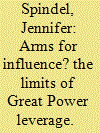

|
|
|
|
|
| Summary/Abstract |
Scholars and policymakers agree that major powers have leverage over their more junior partners. Giving security assistance or providing arms is supposed to increase this leverage. However, major powers often hit roadblocks when trying to influence the behaviour of their junior partners. This article demonstrates that junior partners are often successful in constraining the behaviour of the major power partners, and have particular success in extracting additional resources from their major partners. This article develops the concept of loyalty coercion to explain that leverage is based on rhetorical and symbolic moves, rather than material preponderance. It then uses cases of US arms sales to show that weapons transfers did not lead to US leverage, instead opened opportunities for junior partner influence. The article contributes to scholarly and policy perspectives on alliance management and reputation, and leverage in world politics.
|
|
|
|
|
|
|
|
|
|
|
|
|
|
|
|
| 2 |
ID:
190698
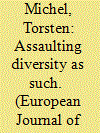

|
|
|
|
|
| Summary/Abstract |
Dehumanisation is one of the most invoked factors in analyses of mass atrocities with many scholars focusing on its crucial role in enabling perpetrators to inflict violence on their victims. However, while its application is widespread, its relevance is often assumed a priori, with claims regarding its empirical relevance often asserted rather than argued for. Not only does its meaning, nature, and function remain amorphous, current scholarship also lacks a general conceptualisation of the basic features that bind the manifold appearances of dehumanisation together. It is this paucity of sustained reflection and particularly the lack of conceptual clarity that the present article seeks to address. Drawing on the work of Hannah Arendt, it aims to deliver a more thoroughgoing appraisal of the nature of dehumanisation as a fundamental violation of plurality to conceptually consolidate and ground its meaning and bind together its diverse manifestations across cases of mass violence.
|
|
|
|
|
|
|
|
|
|
|
|
|
|
|
|
| 3 |
ID:
190703
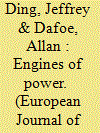

|
|
|
|
|
| Summary/Abstract |
Major theories of military innovation focus on relatively narrow technological developments, such as nuclear weapons or aircraft carriers. Arguably the most profound military implications of technological change, however, come from more fundamental advances arising from ‘general-purpose technologies’ (GPTs), such as the steam engine, electricity, and the computer. Building from scholarship on GPTs and economic growth, we argue that the effects of GPTs on military effectiveness are broad, delayed, and shaped by indirect productivity spillovers. We label this impact pathway a ‘general-purpose military transformation’ (GMT). Contrary to studies that predict GPTs will rapidly diffuse to militaries around the world and narrow gaps in capabilities, we show that GMTs can reinforce existing balances if leading militaries have stronger linkages to a robust industrial base in the GPT than challengers. Evidence from electricity's impact on military affairs, covering the late nineteenth and early twentieth centuries, supports our propositions about GMTs. To probe the explanatory value of our theory and account for alternative interpretations, we compare findings from the electricity case to the military impacts of submarine technology, a non-GPT that emerged in the same period. Finally, we apply our findings to contemporary debates about artificial intelligence, which could plausibly cause a profound GMT.
|
|
|
|
|
|
|
|
|
|
|
|
|
|
|
|
| 4 |
ID:
190699
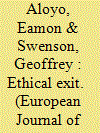

|
|
|
|
|
| Summary/Abstract |
When should peacekeepers partially or fully withdraw from a country or region in which they are operating? This important question has received little scholarly attention. However, it has profound implications. If peacekeepers depart prematurely, as happened in Rwanda in 1994, the consequences can be disastrous with the potential to lead to widespread preventable deaths and human suffering. If they overstay, peacekeepers risk alienating the population they are seeking to protect and undercutting popular sovereignty at significant economic costs. Striking a balance, we propose a framework for just withdrawal that is both normatively compelling and empirically sound. It focuses on three aspects that are vital for understanding when peacekeepers can depart in an ethically justified manner: just cause, effectiveness, and legitimacy. By considering a number of objections, we also address critics who challenge the overarching premise of peacekeeping or might prefer different standards by which to suggest peacekeepers should stay or depart. Finally, we illustrate our argument with theoretical and empirical examples and a discussion of UN peacekeeping in East Timor.
|
|
|
|
|
|
|
|
|
|
|
|
|
|
|
|
| 5 |
ID:
190700
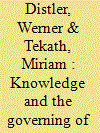

|
|
|
|
|
| Summary/Abstract |
While studies on the role of knowledge and expertise have seen a resurgence of interest in International Relations and in literature on peacebuilding and security governance, little is known how knowledge enters the governance routines after the initial establishment of peacebuilding operations. Taking the mandate decision-making process of MINUSMA and EUTM operations in Mali in the German parliament as case for our explorative study, we ask how knowledge has entered the parliamentary process and how various epistemic practices and epistemic agency shape this peacebuilding governance since 2013. Informed by an object-centred knowledge framework, we argue that the practices and types of agency involved mostly ‘lock-in’ the governing of robust peacebuilding in Mali in much broader foreign- and security policies routines. Epistemic practices are not primarily concerned with new impulses or critical analysis, but with rendering Mali governable as interventionary object. The epistemic authority of the government is dominant and we do not find much evidence that hegemonic knowledge is challenged. Intervening agents do extract certain knowledge via transnational channels from Mali, however, broader knowledge debates or the involvement of Malian agents are missing.
|
|
|
|
|
|
|
|
|
|
|
|
|
|
|
|
| 6 |
ID:
190701


|
|
|
|
|
| Summary/Abstract |
The European Union's cooperation with Middle Eastern regimes to counter terrorism and prevent violent extremism has received increased scholarly attention following several terrorist attacks in Europe the last decade. Despite the EU's emphasis on good governance, democracy, and human rights to prevent violent extremism in the Middle East and North Africa (MENA), I argue that the Union is in fact declining as a ‘normative power’ as it has prioritised a ‘security first’ centred approach. This article demonstrates how the EU's normative projects have, first, appropriated a logic of securitisation; and second, how the Union downplays democracy and good governance in fear of alienating authoritarian key partners in the region. There are consequently inherent limitations to, and contradictions in, the EU's Counter-Terrorism (CT) and Preventing Violent Extremism (PvE) efforts. These conclusions are based on interviews with EU representatives and implementing partners on the ground. The interviews are complemented by an analysis of the scope and focus of the EU's CT and PvE projects. The findings have implications for our understanding of normative powers’ priorities when facing a perceived dilemma of choosing between its security, on the one hand, and its identity and value aspirations, on the other.
|
|
|
|
|
|
|
|
|
|
|
|
|
|
|
|
| 7 |
ID:
190702
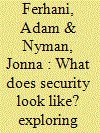

|
|
|
|
|
| Summary/Abstract |
IR’s visual turn has emphasised visual analysis over visual method, centring images of war and crisis. Meanwhile security studies centres great power politics and moments of rupture. Together, they reinforce a dominant image of security as spectacular. This article unites two ethnographic projects focused on everyday security: one examining everyday security landscapes in China, and one examining health security at the UK border. Both found a gap between the dominant image of security and what we saw, and explored this gap through photography. Building on the everyday and visual turns, the article introduces interpretive photography as method to make two contributions. The first is methodological: it introduces interpretive photography as a distinct critical qualitative method that operates on five modes: enabling the seeing-capturing-making-sharing of visual artefacts, it also disrupts dominant visions and contributes to the construction of international relations. The second contribution is empirical: a deeper, richer account of what security looks like. While the discipline associates security with emergency politics or a state of exception, Nyman’s photographs show the exception-made-everyday, while Ferhani’s photos reject the exception by showing banal routines. In this way, photography engages the visuality of security, and can change how we see security.
|
|
|
|
|
|
|
|
|
|
|
|
|
|
|
|
|
|
|
|
|